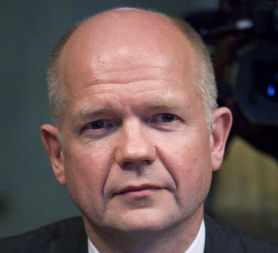Hague: UK must embrace 'networked world'
Updated on 01 July 2010
Today's foreign policy speech by William Hague will be welcomed in Brussels, the Centre for European reform tells Channel 4 News. But Labour's David Miliband says Tory alliances within the EU will undermine the foreign secretary's efforts.

Britain will be working towards a foreign policy that is "clear, focused and effective," according to William Hague.
In his first major speech on foreign policy since the general election, the foreign secretary stressed the need for the UK to exploit its connections in what he repeatedly referred to as a "networked world".
"Today influence increasingly lies with networks of states," he said.
He cited the EU as an example of a "changing network, where its members can make the most of what each country can bring to the table".
He went on to promise that Britain would aim to boost its influence within the EU by increasing the numbers of UK nationals in senior posts. The coalition would be "highly activist in our approach to the European Union".
William Hague’s address to the FCO
Read a transcript of the Foreign Secretary's speech
Mr Hague accused the previous Labour government of neglecting to ensure enough British officials won key EU posts, in the process allowing a "generation gap" to develop during its 13 years in power.
"As a new government, we are determined to put this right," he said.
Criticising Britain's "ad hoc" approach in recent years to the development and maintenance of relationships with other countries, Mr Hague said that even within the EU it was no longer sensible or possible just to focus on the larger countries.
"The country that is purely reactive in foreign affairs is in decline," he asserted.
Clara O'Donnell, of the Centre for European Reform, said today's speech represents "a transition in the relative importance (Wiliam Hague) accords to the EU", and she predicted that it would be "very well received in Brussels".
A transformation in attitudes to the EU
One of the aspects of William Hague's speech that is very striking is the emphasis on the EU and the very constructive tone being used, Clara O'Donnell, research fellow at the Centre for European Reform, told Channel 4 News.
If we compare today's address to speeches by William Hague a year ago, there has clearly been a transition in the relative importance he accords to the EU. He has been very critical of the EU in the past, but the tone here is very positive.
The speech will be very well received in Brussels and the EU. The two points he highlights – working with EU states and with EU institutions – are two points other members states have raised in the past.
In recent years smaller member states have said they felt the UK was not investing enough in developing relations with them. The UK was thought to have a short-term approach to relations. Not enough importance was devoted to building relationships with the smaller countries, which is essential if you want to push your ideas through.
Countries like Poland frequently told us they felt the UK had not put enough effort in trying to build constructive relationships. The eastern European countries are countries with whom the UK has a natural affinity, but in the past they have felt the EU did not do enough to build relationships.
To read more, click here
But David Miliband, Labour's last foreign secretary, was sceptical of the coalition government's chances to wield greater influence within the European Union.
In a statement to Channel 4 News, he said: "The idea that this coalition will bring renewed influence to the European Union, when the prime minister is not even in the room with the key decision-makers because of his political alliances, is just plain wrong."
According to the foreign secretary, the number of British officials at director level in the European Commission has fallen by one-third since 2007, and the number of UK posts by 205 overall.
The UK represents 12 per cent of the EU population but has just 1.8 per cent of staff in entry-level positions at the commission.
Mr Hague said that the new National Security Council should ensure that "foreign policy runs through the veins of the entire administration", bringing together strategic decisions about foreign affairs, security, defence and development.
The coalition cited five arguments for the formulation of a new UK foreign policy. They were -
- The shift of economic power and economic opportunity to "the countries of the east and of the south" in the world.
- The fact that international decision-making has become "wider and more multilateral".
- The increasing complexity of protecting the country in the face of new security threats.
- The changing nature of conflict in the world.
- The emergence of a networked world.
Mr Hague used the speech to reassert the primacy of Britain's relations with the United States, referring to "our unbreakable alliance... which is our most important relationship - and will remain so".
He also mentioned the commonwealth ("one of the world's most long-standing networks") and countries such as Turkey, as well as African nations including Kenya, Nigeria and South Africa, as areas where the UK will aim to maintain and develop its relations.
His pledge of "a renewed focus on our relations with Japan and further deepening of our partnership with China" prompted former foreign secretary David Miliband to remark: "The idea that he is going to bring a new dynamic to our rleationship with China, when on my last visit as foreign secretary I secured a strategic diaologue without compare, is a non-starter."





